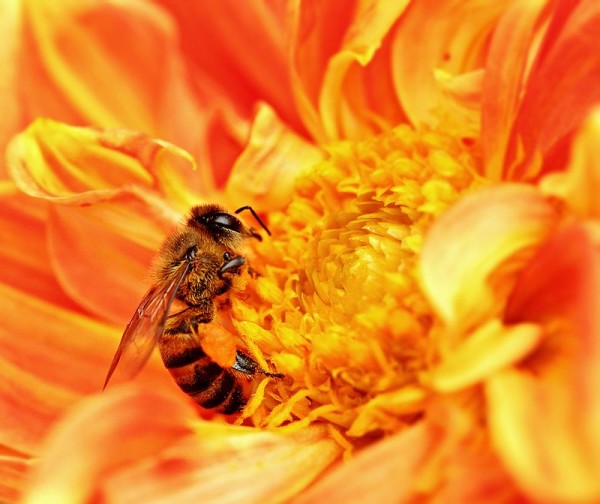By Ana Verayo, | February 27, 2016

A Honey Bee takes nectar from a flower as pollen grains stick to its body in Tanzania
The survival of bees and other pollinators are now at serious risk that can lead to the disappearance of vital crops such as apples, coffee and blueberries, that can cost hundreds of billions of dollars every year, according to a global analysis of pollinators.
Like Us on Facebook
Pollinators include more than 20,000 species of not just bees but also butterflies, beetles, bats and birds that fertilize flowers by spreading their pollen. In this new study, pesticides, habitat loss to farms and cities, diseases and climate change were identified as threats to these important creatures.
According to Zakri Abdul Hamid who is the lead author of this report that includes data from 12 nations, about US $235 billion and $577 billion worth of food are dependent on these pollinators, stating that pollinators are truly critical to the global economy and human health.
Food sector jobs worldwide amount to millions, including coffee pickers in South America, cocoa farmers in Africa and almond growers in the United States including apple producers in China. This study is the first report from the Intergovernmental Science-Policy Platform on Biodiversity and Ecosystem Services that has been approved during talks in Kuala Lumpur. This IPBES report is also modelled after the climate change UN report, advising how governments can approach and manage the effects of climate change.
The report includes regional and national assessments of insect pollinators revealing that the highest levels of threat are that of bees and butterflies where in Europe, nine percent of bee and butterfly species are at risk of extinction.
This study pinpoints these risks such as pesticides especially neonicotinoids that are linked to population die-offs in North America and Europe, however, it also said that there are still many holes to fill when it comes to the long term effects of health damages from pesticides.
According to co-author of the study, Simon Potts from the University of Reading, it is definitely harmful to wild bees but long term effects are still unknown for bee populations.
Apart from pesticides, genetically modified crops also have a significant impact on pollinators which is still poorly understood. Farm crop output that is dependent on pollination alone has risen to 300 percent in the last 50 years, as the western honey bee which the most widespread pollinator that is controlled by humans, now produces 1.6 million tons of honey every year.
Zakri says that this report still offers some good news, where a number of steps can be carried out to reduce these risks such as planting patches of wild flowers to attract more pollinators near fields of crops and reducing pesticide use or a shift to organic methods can prevent further damage.
-
Use of Coronavirus Pandemic Drones Raises Privacy Concerns: Drones Spread Fear, Local Officials Say

-
Coronavirus Hampers The Delivery Of Lockheed Martin F-35 Stealth Fighters For 2020

-
Instagram Speeds Up Plans to Add Account Memorialization Feature Due to COVID-19 Deaths

-
NASA: Perseverance Plans to Bring 'Mars Rock' to Earth in 2031

-
600 Dead And 3,000 In The Hospital as Iranians Believed Drinking High-Concentrations of Alcohol Can Cure The Coronavirus

-
600 Dead And 3,000 In The Hospital as Iranians Believed Drinking High-Concentrations of Alcohol Can Cure The Coronavirus

-
COVID-19: Doctors, Nurses Use Virtual Reality to Learn New Skills in Treating Coronavirus Patients







